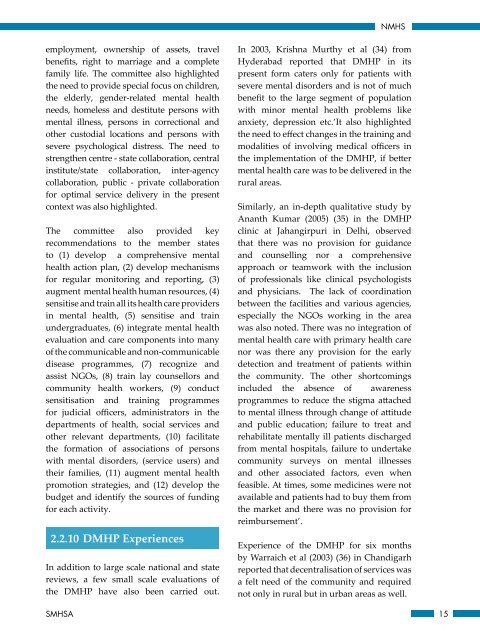National Mental Health Survey of India 2015-16
NMHS%20Report%20%28Mental%20Health%20Systems%29%201
NMHS%20Report%20%28Mental%20Health%20Systems%29%201
You also want an ePaper? Increase the reach of your titles
YUMPU automatically turns print PDFs into web optimized ePapers that Google loves.
NMHS<br />
employment, ownership <strong>of</strong> assets, travel<br />
benefits, right to marriage and a complete<br />
family life. The committee also highlighted<br />
the need to provide special focus on children,<br />
the elderly, gender-related mental health<br />
needs, homeless and destitute persons with<br />
mental illness, persons in correctional and<br />
other custodial locations and persons with<br />
severe psychological distress. The need to<br />
strengthen centre - state collaboration, central<br />
institute/state collaboration, inter-agency<br />
collaboration, public - private collaboration<br />
for optimal service delivery in the present<br />
context was also highlighted.<br />
The committee also provided key<br />
recommendations to the member states<br />
to (1) develop a comprehensive mental<br />
health action plan, (2) develop mechanisms<br />
for regular monitoring and reporting, (3)<br />
augment mental health human resources, (4)<br />
sensitise and train all its health care providers<br />
in mental health, (5) sensitise and train<br />
undergraduates, (6) integrate mental health<br />
evaluation and care components into many<br />
<strong>of</strong> the communicable and non-communicable<br />
disease programmes, (7) recognize and<br />
assist NGOs, (8) train lay counsellors and<br />
community health workers, (9) conduct<br />
sensitisation and training programmes<br />
for judicial <strong>of</strong>ficers, administrators in the<br />
departments <strong>of</strong> health, social services and<br />
other relevant departments, (10) facilitate<br />
the formation <strong>of</strong> associations <strong>of</strong> persons<br />
with mental disorders, (service users) and<br />
their families, (11) augment mental health<br />
promotion strategies, and (12) develop the<br />
budget and identify the sources <strong>of</strong> funding<br />
for each activity.<br />
2.2.10 DMHP Experiences<br />
In addition to large scale national and state<br />
reviews, a few small scale evaluations <strong>of</strong><br />
the DMHP have also been carried out.<br />
In 2003, Krishna Murthy et al (34) from<br />
Hyderabad reported that DMHP in its<br />
present form caters only for patients with<br />
severe mental disorders and is not <strong>of</strong> much<br />
benefit to the large segment <strong>of</strong> population<br />
with minor mental health problems like<br />
anxiety, depression etc.’It also highlighted<br />
the need to effect changes in the training and<br />
modalities <strong>of</strong> involving medical <strong>of</strong>ficers in<br />
the implementation <strong>of</strong> the DMHP, if better<br />
mental health care was to be delivered in the<br />
rural areas.<br />
Similarly, an in-depth qualitative study by<br />
Ananth Kumar (2005) (35) in the DMHP<br />
clinic at Jahangirpuri in Delhi, observed<br />
that there was no provision for guidance<br />
and counselling nor a comprehensive<br />
approach or teamwork with the inclusion<br />
<strong>of</strong> pr<strong>of</strong>essionals like clinical psychologists<br />
and physicians. The lack <strong>of</strong> coordination<br />
between the facilities and various agencies,<br />
especially the NGOs working in the area<br />
was also noted. There was no integration <strong>of</strong><br />
mental health care with primary health care<br />
nor was there any provision for the early<br />
detection and treatment <strong>of</strong> patients within<br />
the community. The other shortcomings<br />
included the absence <strong>of</strong> awareness<br />
programmes to reduce the stigma attached<br />
to mental illness through change <strong>of</strong> attitude<br />
and public education; failure to treat and<br />
rehabilitate mentally ill patients discharged<br />
from mental hospitals, failure to undertake<br />
community surveys on mental illnesses<br />
and other associated factors, even when<br />
feasible. At times, some medicines were not<br />
available and patients had to buy them from<br />
the market and there was no provision for<br />
reimbursement’.<br />
Experience <strong>of</strong> the DMHP for six months<br />
by Warraich et al (2003) (36) in Chandigarh<br />
reported that decentralisation <strong>of</strong> services was<br />
a felt need <strong>of</strong> the community and required<br />
not only in rural but in urban areas as well.<br />
SMHSA<br />
15


